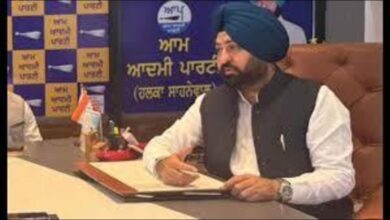Rajasthan, Madhya Pradesh speed up implementation of farmer welfare schemes

NEW DELHI: BJP-ruled Rajasthan and Madhya Pradesh are looking at advancing implementation of welfare schemes for farmers following their mass mobilisation in Maharashtra. The former two BJP-ruled states are scheduled to go to polls this yearend. At crucial meetingslast Mondayboth CMs have decided on a slew of measures that would be announced soon. Rajasthan chief minister Vasundhara Raje has asked officers “to give her a briefing everyday on situation of farmers in the country.” She also asked her team to look at the specific case of the crops in the state whose harvest has just come into the market but the procurement promised by government will start only in April.
For the last one year, unrest among farmers has been simmering across the state. Farmers had laid siege to Sikar, 100 km from Jaipur. The opposition has said that farmers are unhappy in most parts of Rajasthan mainly because of government’s inability to purchase produce at minimum support price and loan waiver was a temporary solution. It has demanded the state government implement its policy of purchasing crop at 50% above the cost price so that farmers don’t fall into a debt trap.
The state government had recently extended crop loan waiver to all farmers who had availed loans of up to Rs 50,000 from cooperative banks and extended the benefit of its one-time crop loan waiver. Raje has specifically asked her trusted officers to be more proactive in the next few months. A senior official in the Rajasthan government said the focus of the establishment was to ensure that welfare reached the farmers.
“With elections arriving soon, a lot will depend on how happy the farmers are. We have studied the situation here. In Maharashtra there is much more intensive agriculture and cash crops. Here, mustard is grown and 70% of it is sent to other states, it is easy to handle. Maximum farmers grow bajra and is consumed locally.
Wheat is procured mostly by Food Corporation of India; basmati goes to multi-brand retail; soyabean is produced in large scale but our holding sizes are bigger. We take stock of every crop to ensure the farmers welfare is not hit,” said an official.
The government has been consulting farmer associations and in one such recent meeting, farmer unions were asked not to neglect cattle and supplement their income as they did even during the drought of 2003. “We have a commission now which has already began its consultations with farmer bodies,” he said.
After the infamous Mandsaur farmers’ agitation last year, where five farmers died, the MP government has been getting a detailed report from collectors every fortnight. Chief minister Shivraj Chouhan plans to extend the Bhavantar scheme to cotton, apart from 25 existing ones, and introduce five changes to welfare schemes, which includes giving defaulting farmers one month leeway to pay off loans.
MP has also formed a committee to survey the situation of farmers, which is expected to present its report to the CM by April.
Principal secretary Rajesh Rajora said that government was planning to roll out more farmer centric schemes.
“The CM is being provided a detailed report every week on the farmers’ situation,” he said, adding that the Maharashtra farmers’ agitation is being watched closely as lessons are very important. “We have found procurement ends up benefitting others but not farmers. Operating cost of bhavantar is only 17%. It is giving them payment or right price and it is easier for the government to implement,” he said, adding that the state government officials were meeting as many farmer bodies as possible.






